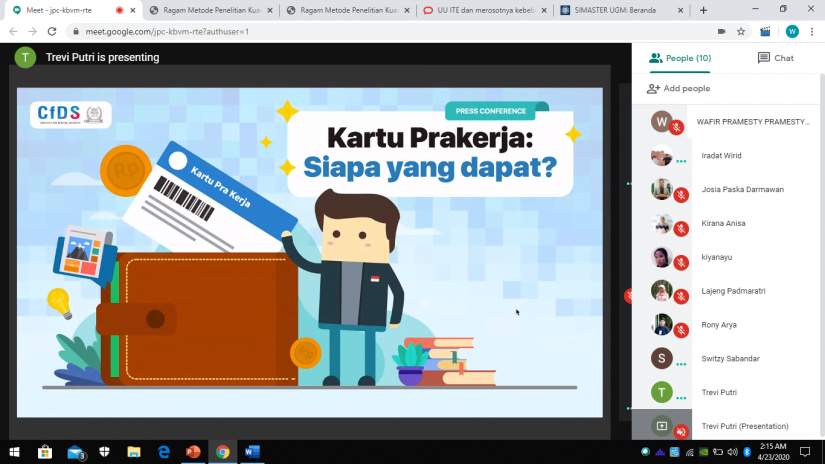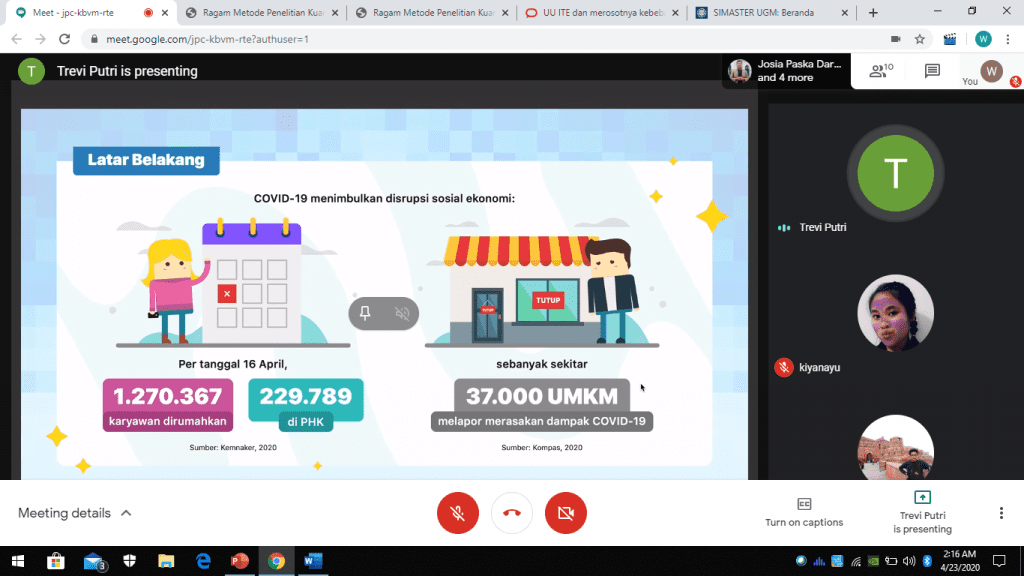
Yogyakarta, April 23rd, 2020— Under the adoption of Presidential Regulation no. 36/2020 on February 26th, 2020 by President Joko Widodo, the official Pre-Work Card program can be pursued by Indonesians who comply with the terms and conditions of the program. Considered a form of response to the issuance of the Pre-Work Card program, Center for Digital Society (CfDS) Fisipol UGM as the study center produced research aimed at identifying the potential implementation of the Pre-Work Card program by considering the digital landscape in Indonesia. The research was delivered through an online press conference on Thursday (23/4), by two CfDS researchers, Treviliana Eka Putri, M.Int.Sec. and Paska Darmawan, M.S. Press conference conducted by CfDS through Google Meet platform also invited media colleagues to attend the event. The event started at 10.00 WIB moderated by Kirana Anisa.

Besides the health issues, COVID-19 have caused socio-economic disruption. Based on the source from the Ministry of Manpower on April 16th, 2020, a total of 1,270,367 employees were dismissed with 229,789 of them were laid off. Reported from Kompas, around 37,000 MSMEs reported perceiving the effects of COVID-19. According to Minister of Finance Sri Mulyani, the sectors most negatively affected were the tourism, transportation, and financial sectors. In response to this, the government is certainly taking steps, including the launch of the Pre-Work Card program to reduce the impact felt by the people. Nevertheless, the Pre-Work Card has drawn some criticism, including:
- subsidies through the form of training do not answer the needs of people who need food,
- suspicion of several companies owned by government officials used, and
- similar types of classes that can be obtained for free easily on YouTube channels.
At least until April 18th, 2020, there were 742 classes offered by ten digital platforms that had partnered with the government in the Pre-Work Card program, with MauBelajarApa as the platform that had the highest number of classes (attaining 165 classes). In the data also presented the number of classes from other platforms. Based on CfDS research, there were at least nine categories of classes that can be followed with varied prices, from the cheapest price range from Rp29,000,- to Rp3,500,000,-. Through the distribution of nine class categories and 742 classes offered, as many as 44.2% of the classes offered are related to improving the digital abilities of the participants.
“Hence we see that actually with the future employment trends that use more digital devices and require digital capabilities, it is important for Indonesian people, especially this workforce to have these digital skills. So that 44.2% of the classes are offered for digital themes seems to be okay to continue, to build a digitally literate workforce,” said Treviliana.
In its study, CfDS highlighted the importance of Indonesia’s digital disparity factor to be considered in the implementation of the Pre-Work Card program. Under the internet penetration rate in 2020 of 64% of the total population of Indonesia, Association Indonesian Internet Service Providers (APJII) states that 56% of the internet users are on Java island. Furthermore, the accessibility of network infrastructure and community income is the indicator of inequality in the number of internet users in Indonesia. An analysis of public sentiment towards this program was carried out on April 10th-18th, 2020 through Twitter with a total of 90,830 tweets based on the keywords “prakerja, pra-kerja, pra kerja, and #kartuprakerja.”
In the research, there were a number of tweets with the high level of engagements, which emphasized in the public’s anxiety over the things related to the Pre-Work Card, particularly the costs incurred to access the Pre-Work Card classes and the “dominance” of digital-themed classes. CfDS concluded that the target recipients of the Pre-Work Card program are Indonesian people with good digital skills and have access to the internet and other digital technologies.
“For recommendations, the government needs to reconsider the accessibility and capacity of the prospective Pre-Work Card participants, the government needs to ensure the security and data privacy from the participants, especially related to policies when there is a data-sharing mechanism between the government, the platforms, and other third parties,” said Paska. After the presentation of research results by CfDS, the moderator opened a question and answer session. The discussion ended at 11.10 WIB.
